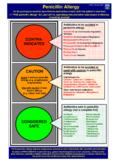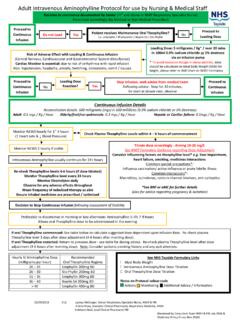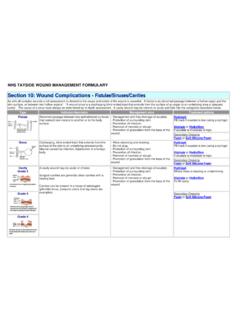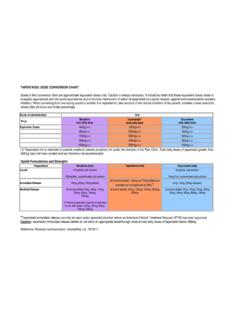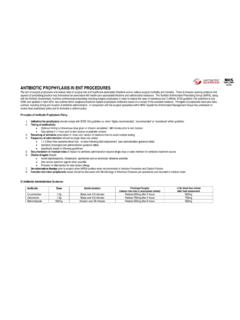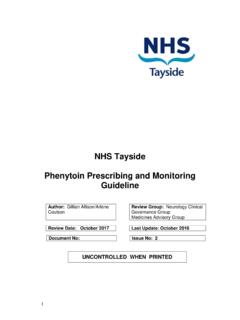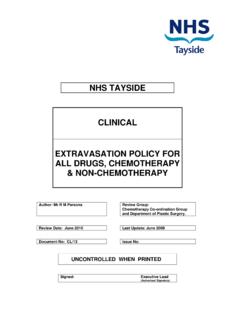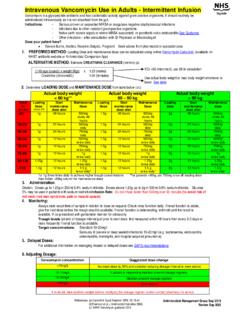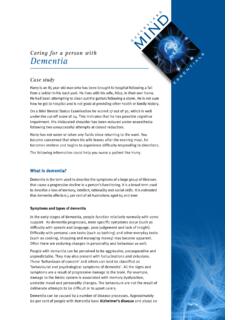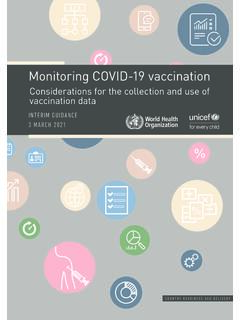Transcription of Antipsychotics in older people with dementia
1 Tayside guidance Antipsychotics and Benzodiazepines in older adults with dementia and/or delirium- inpatient settings Best practice in diagnosis of delirium is highlighted in SIGN 157. Non-pharmacological interventions should always be first line in dementia and delirium. Ensure other possible therapies and causes have been investigated physical causes, psychological causes and environmental factors before initiating antipsychotic medication. Refer to the Quick Reference Guide for possible causes. Clinicians are reminded of the need to involve patients and relevant others in decisions about medication- see Adults with incapacity (Scotland) Act 2000 Medical treatment flowchart and certificate Side-effects of medication In older people , Antipsychotics must be used with particular caution because of the side- effect profile, including extrapyramidal symptoms, sedation, anticholinergic effects including increased confusion, cardiovascular effects and tardive dyskinesia.
2 See the BNF and MHRA website for further information. Patients/caregivers should be cautioned to immediately report signs and symptoms of potential cardiovascular adverse events such as sudden weakness or numbness in the face, arms or legs, and speech or vision problems. An information sheet on the use of antipsychotic medication in people with dementia is available on the Alzheimer's Scotland website In older people , pharmacodynamic and pharmacokinetic changes can lead to increased sensitivity to and accumulation of hypnotics and anxiolytics such as benzodiazepines. This can lead to increased confusion. 1. dementia Before treating new symptoms of stress or distress in a person with dementia , the possibility that the person has delirium or depression should be excluded. See Clinical Features of dementia , Depression and Delirium. It is not appropriate to initiate antipsychotic medication to manage symptoms which are unlikely to be modified by antipsychotic medication wandering, repetitive vocalisation, resistiveness, sleep disturbance, repetitive questioning.
3 In older people with dementia , antipsychotic drugs (atypical and typical) are associated with a small increased risk of mortality and an increased risk of stroke or transient ischaemic attack. They may be prescribed with caution in the management of stress or distress (psychosis, aggression, or severe agitation/anxiety) associated with some types of dementia only after adequate analysis of the potential risks and benefits. It is important to remember that such behaviour can be a temporary phenomenon and that drugs should be prescribed on a short-term basis. dementia is very common in patients with Parkinson's Disease, and is most likely to be of dementia with Lewy bodies (DLB) pathology or may be of Alzheimer's Disease pathology. Antipsychotic use in people with dementia with Lewy Bodies is associated with increased mortality. Alternative medication such as Cholinesterase Inhibitors may be useful for visual hallucinations in this group. There is little evidence base for the treatment of Stress and Distress in vascular or stroke related dementia or other dementias.
4 Guidance prepared March 2014: Claire James, Kate Wood. Reviewed June 2019 Fiona Fitzroy-Kelly, Christine Morton, Kate Wood, Claire James. Consultation: Mental Health Sub Group for older people , updated October 2020. Review date: October2022. Antipsychotics may be used in combination with cholinesterase inhibitors under specialist supervision. 2. Delirium SIGN 157 makes no specific recommendations regarding medication for delirium and the medication advice below is by local agreement only. Using antipsychotic medication or benzodiazepines in people with delirium has the potential to increase confusion. If commenced, Antipsychotics prescribed for delirium should be reviewed on a daily basis and stopped as soon as the clinical situation allows, typically within 1-2 days. In situations where it is deemed safer to continue antipsychotic therapy for delirium beyond discharge or transfer from hospital, a clear plan for early medication review and follow up in the community should be agreed.
5 For specialist advice on delirium management in palliative care see Scottish Palliative Care Guidelines. For specialist advice on delirium management in coronavirus see the advice developed by the British Geriatrics Society, European Delirium Association, and Old Age Psychiatry Faculty (Royal College of Psychiatrists). 3. Medication ( Antipsychotics and benzodiazepines)- advice Drug choices are similar, but used differently for dementia and delirium. Medication should only be used where other strategies (including non-drug treatments evidence-based psychological interventions (requires Athens login) have been tried and failed. Other reasons for behavioural problems, including physical problems need investigated before prescribing medication. The target symptoms for which medicines are prescribed must be identified and the effect of treatment of these symptoms monitored. Patients who are prescribed medication must have their prescription reviewed regularly and always before discharge from hospital.)
6 Refer to the Good practice guides before prescribing Antipsychotics in people with dementia and/or delirium: Rationalisation of Antipsychotics in people with dementia : initiation of treatment and reduction and cessation of treatment An approximately 3-fold increased risk of cerebrovascular adverse events have been seen in randomised placebo controlled clinical trials in the dementia population with some atypical Antipsychotics . The mechanism for this increased risk is not known. An increased risk cannot be excluded for other Antipsychotics or other patient populations. Antipsychotics should be used with caution in patients with risk factors for stroke. Follow up of patients was for up to 5 years, and the risk gradually returns to usual level for people with dementia on stopping the antipsychotic. QTc interval monitoring is recommended before initiation of haloperidol; if the QTc interval is increased (above 440msec) contact psychiatry liaison for advice.
7 Haloperidol, Risperidone, or Quetiapine may be used for Stress and Distress in Alzheimer's Disease or delirium (only haloperidol licensed for use in both indications). however, haloperidol or risperidone, should not be used in the presence of Parkinson's Disease. Quetiapine [unlicensed use off-label'] may also be used for Guidance prepared March 2014: Claire James, Kate Wood. Reviewed June 2019 Fiona Fitzroy-Kelly, Christine Morton, Kate Wood, Claire James. Consultation: Mental Health Sub Group for older people , updated October 2020. Review date: October2022. Stress and Distress in dementia with Lewy bodies or in patients with Parkinson's disease with dementia or delirium at lower doses than in younger patients. Lorazepam [unlicensed use off-label] may also be used in dementia with Lewy bodies or in Parkinson's disease with dementia or delirium, however benzodiazepines markedly increase the probability of delirium developing in a variety of settings therefore caution is required.
8 Parkinson's Disease and dementia with Lewy Bodies require specialist input from a Medicine for the Elderly consultant, neurologist specialising in Parkinson's Disease or psychiatry before antipsychotic or benzodiazepine medicine initiation. Stress and Distress in Alzheimer's Disease and/or delirium FIRST CHOICE: HALOPERIDOL. Haloperidol tablets 500micrograms, , oral liquid 1mg/mL, 2mg/mL. Dose: Persistent aggression and psychotic symptoms in moderate to severe Alzheimer's dementia and vascular dementia when non-pharmacological treatments ineffective and there is a risk of harm to self or others [licensed use], by mouth, initially 500micrograms once or twice daily; max. dose twice daily. Dose: Acute delirium when non-pharmacological treatments ineffective [licensed use], by mouth, initially 500micrograms once or twice daily, max dose twice daily. Review daily, typical duration 1-2 days. QTc prolongation and/or ventricular arrhythmias, in addition to sudden death, have been reported with haloperidol.
9 The risk of these events appears to increase with high doses, high plasma concentrations, in predisposed patients or with parenteral use. Caution is advised in patients with bradycardia, cardiac disease, family history of QTc prolongation or history of heavy alcohol exposure. Caution is also required in patients with potentially high plasma concentrations. A. baseline ECG is recommended before treatment. During therapy, the need for ECG monitoring for QTc interval prolongation and for ventricular arrhythmias must be assessed in all patients. Whilst on therapy, it is recommended to reduce the dose if QTc is prolonged, but haloperidol must be discontinued if the QTc exceeds 500 ms. Haloperidol is contra-indicated for use with other medication that prolongs QT interval. For this reason, in practice where it is not practical to confirm an ECG, haloperidol should be avoided if there is known prolonged QTc, predisposing conditions or comorbidities affecting QTc, or other medicines known to affect QTc.
10 See rationalisation of Antipsychotics in people with dementia and/or delirium Good Practice Guides for prescription/ initiation of treatment and for reduction and cessation of treatment. Risperidone tablets 500micrograms, orodispersible tablets 500micrograms, liquid 1mg/mL. Dose: Short-term treatment (up to 6 weeks) of persistent aggression in patients with moderate to severe Alzheimer's dementia unresponsive to non-pharmacological approaches and when there is a risk of harm to self or others [licensed indication], psychosis or severe agitation/anxiety in Alzheimer's Disease [unlicensed use off-label'], by mouth, initially 250micrograms twice daily, increased according to response in steps of 250micrograms twice daily on alternate days; usual dose 500micrograms twice daily (up to 1mg twice daily has been required). Dose: Short-term treatment (typically 1-2 days) of severe agitation/ anxiety in delirium [unlicensed use off-label'] by mouth initially 250micrograms twice daily, increased according to response in steps of 250micrograms twice daily on alternate days.
